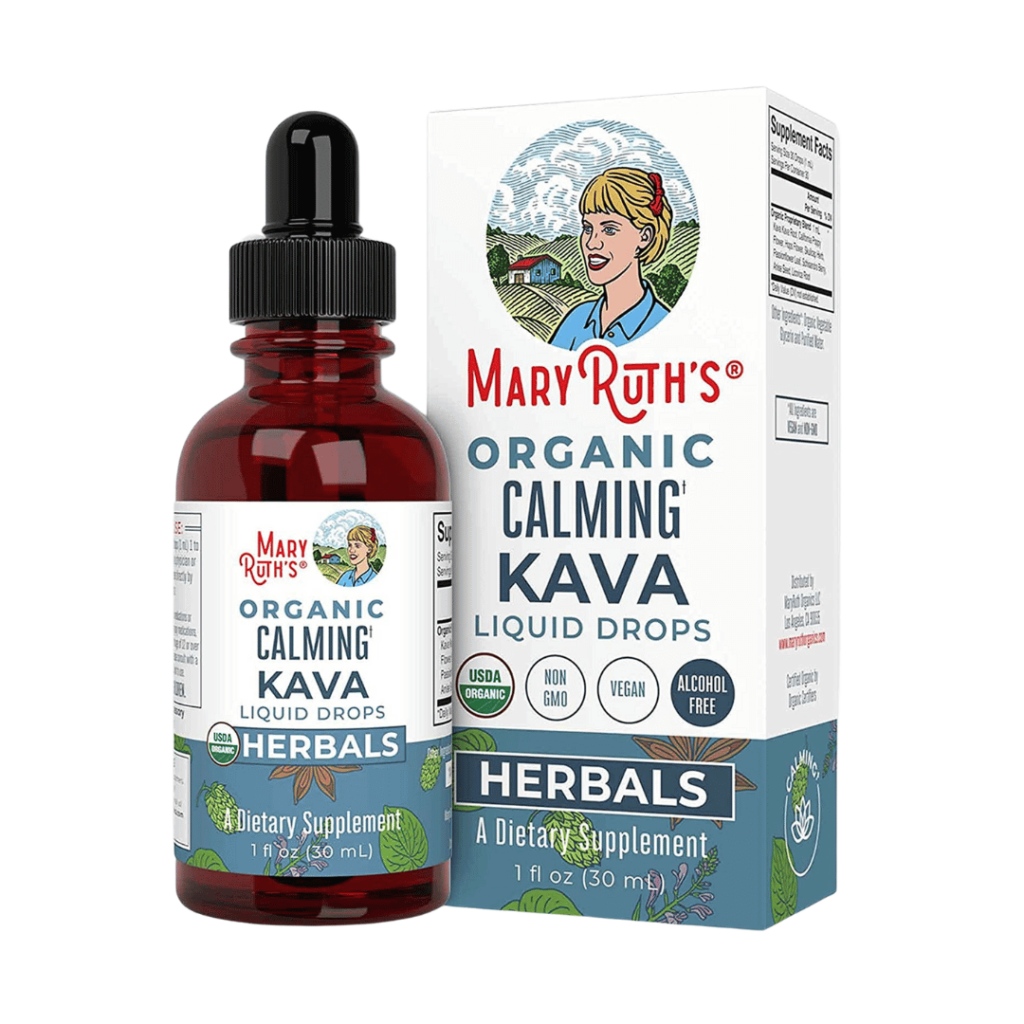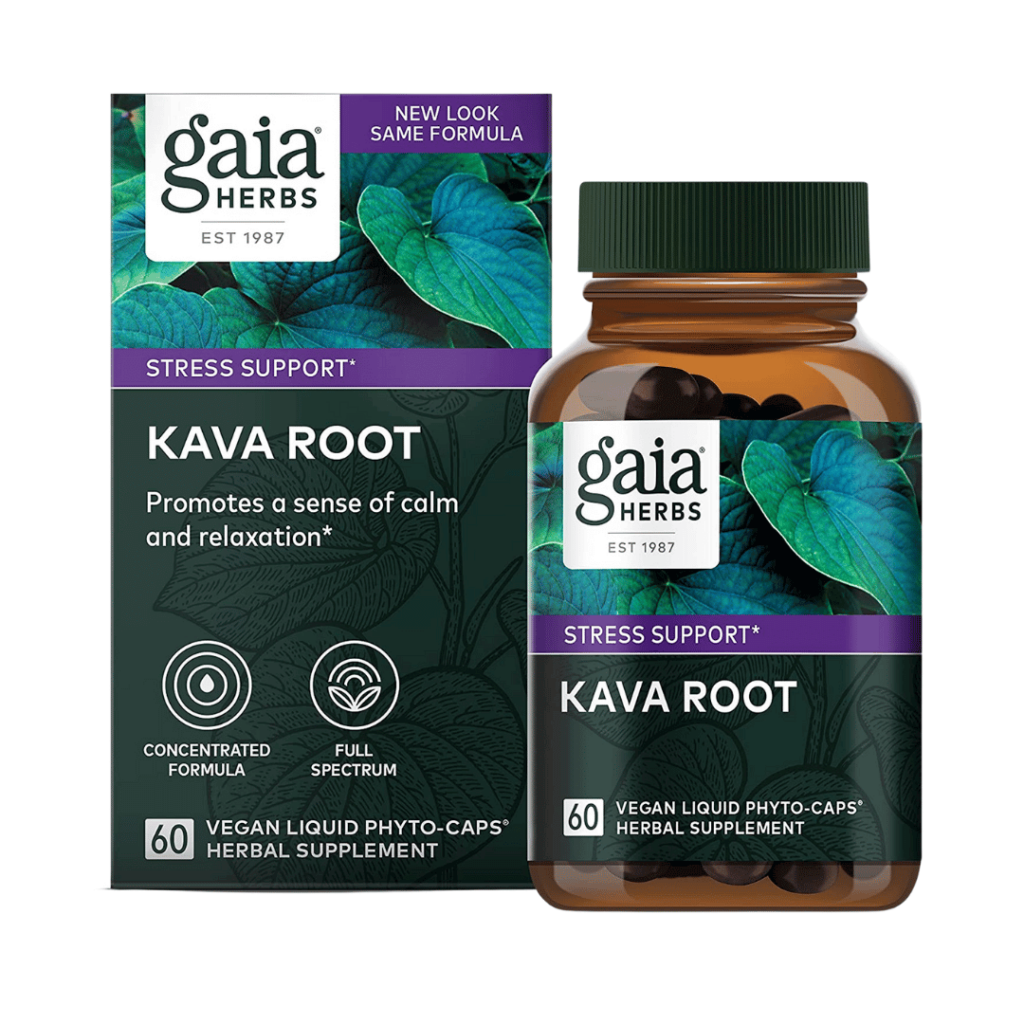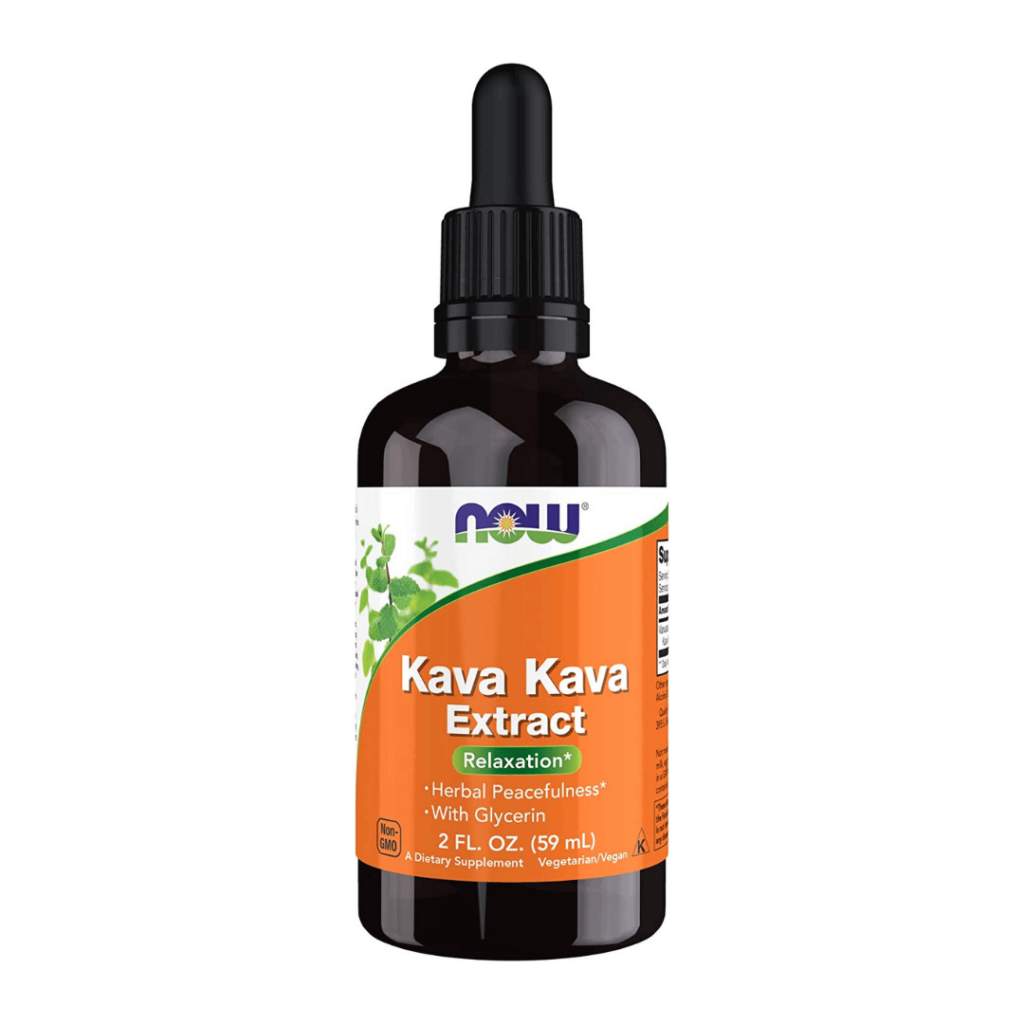Kava bars are popping up around the country. This ancient plant is thought to help with productivity, relaxation, and focus. Many people are using it as an alternative to alcohol since it gives you a similar buzzed and relaxed feeling! So what is kava and is it safe? Who should avoid it and does it have side effects?
Keep reading to learn more about drinking kava with caveats (… or should I say, kaveats?).
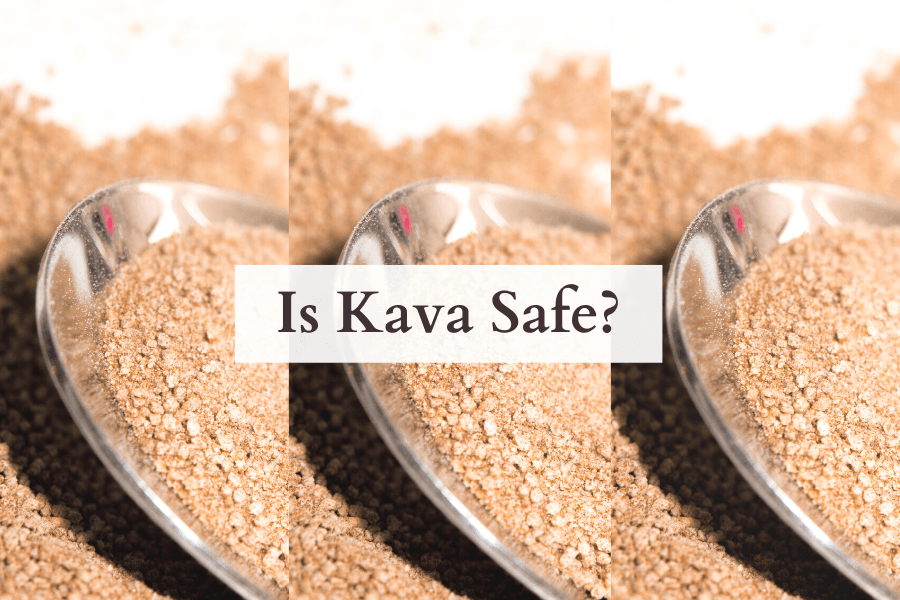
Note: This article contains affiliate links, meaning In On Around will make a small commission at no additional cost to you. This helps me maintain the site. As always, I value full transparency & only work with brands I love and trust.
What Is Kava?
Kava is made from the root of a plant in the South Pacific, Piper methysticum, which is a member of the pepper family. It’s traditionally been used in formal, sacred, ancient ceremonies in Polynesian culture. [1] In fact, the name “kava” is referring to its bitter taste in the Indigenous language of Tongan.
In the modern world, kava has become an increasingly popular social beverage since it doesn’t cause a hangover like alcohol. It’s become a popular supplement for anxiety since it’s a central nervous system depressant, sedative, and inebriant. Depressant drugs (like alcohol) help to slow down the body and mind (which is why they’re popular if you’re having an anxiety or panic attack).
Known as “Nature’s Xanax,” the kava plant root contains 18 different phytochemicals, also known as kavalactones. It mostly consists of the phytochemicals kawain, dihydrokawain, and methysticum. These kava pyrones can cause drug interactions and their potency depends on how the plant was grown.
How Kava Is Consumed
So, how is kava used and ingested? Kava is usually consumed in a number of different forms, such as a:
- Drink (usually brown-colored that’s mixed with water or coconut water)
- Powder
- Capsule
- Extract
- Liquid drops
- Tea
In some parts of the world, the plant root is even chewed to consume the kava extract. After consuming, you’ll usually feel the effects within 10-15 minutes and it usually lasts about 3-4 hours. It usually gives a mild to moderate sedative effect.
Other Names For Kava
Kava has many different names, such as: [2]
- Kava kava
- Piper methysticum (which is the plant name)
- Kawa
- Waka
- Lewena
- Ava pepper
- Yagona (common in Fiji)
- Grog (common amongst aboriginal tribes)
- Sakau (common in Pohnpei)
- Awa or ‘awa (common in Hawaii)
- Ava or ‘ava (common in Samoa)
- Wati (common in New Guinea)
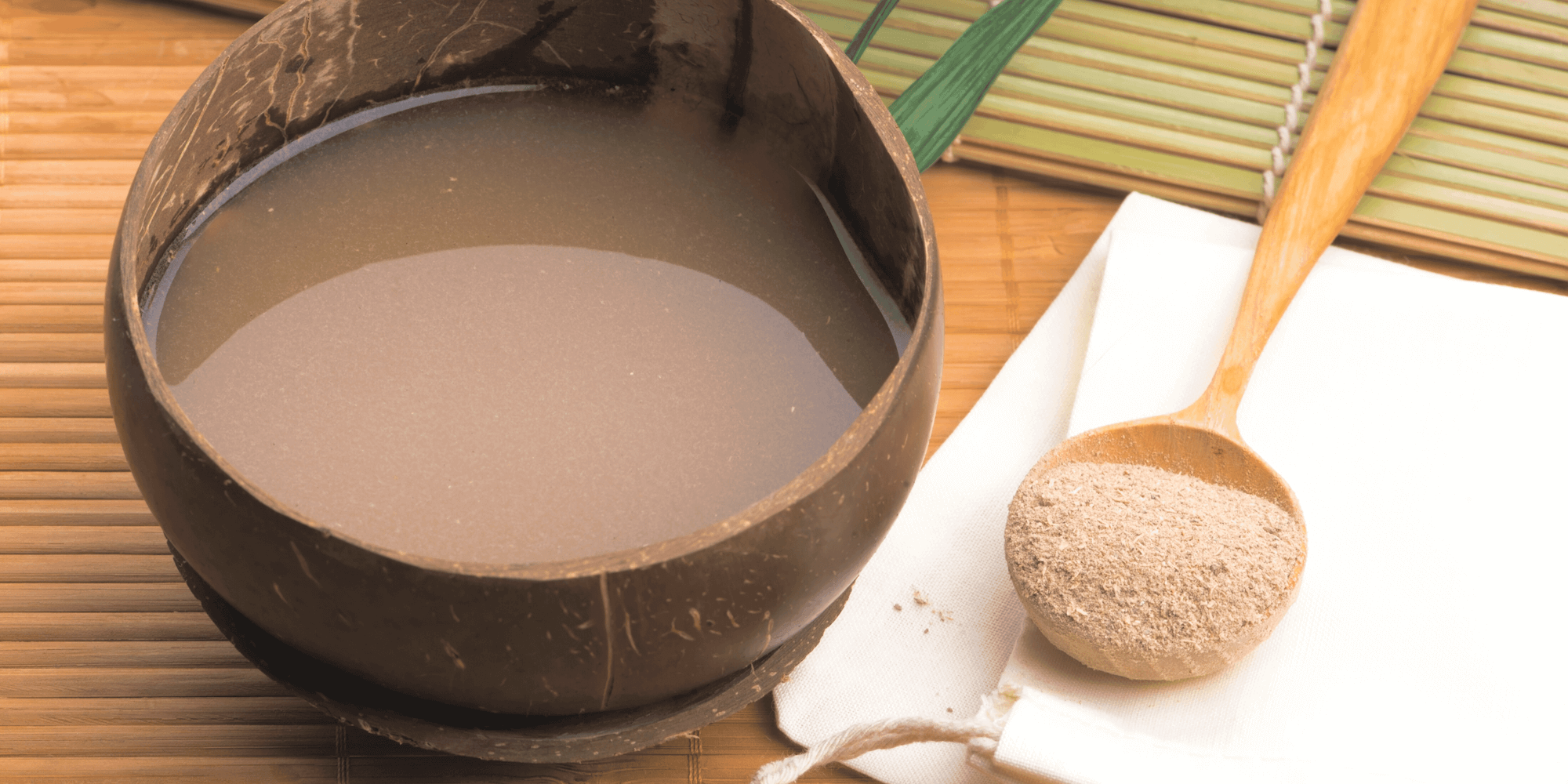
How Does Kava Work?
It’s not completely understood how the 18 different kavalactones in kava react. According to animal studies, it’s suggested that kava interferes with norepinephrine reuptake and can influence the vagal heart tone in people with generalized anxiety. [3] It also impacts the GABA (gamma-aminobutyric acid) and NMDA (N-methyl-D-aspartate) nerve receptors. [4, 5] Hippocampal neurons, acetylcholinesterase, and dopamine may also be impacted.
How Much Kava Is Safe?
It’s very hard to tell how much kava is actually safe to consume since so many studies test at different levels.
Usually, kava is consumed in doses of 60-250 mg for an adult. Some studies claim that 400 mg of kava a day is safe for most people, however, I always like to err on the side of caution. [6] It’s best to avoid more than 250 mg in one day (and make sure you’re not drinking it consecutively or regularly).
Kava and Valium (diazepam) cause similar changes in brain wave activity. [16]
Kava Root Benefits
The health impacts of kava have been well-studied and documented. Kava has the potential to…
- Reduce anxiety (in the short-term) [7]
- Decrease stress and relax muscles [8]
- Aid in pain relief [9]
- Increase euphoric feeling [10]
- Provide neuroprotective effects [11]
- Treat certain kinds of cancer [12, 13]
- Provide anti-inflammatory properties [14]
- Improve sleep quality and decrease insomnia [15]
Kava Side Effects
While there are certainly potential health benefits to kava, there are also potential health drawbacks. Some countries have taken kava off the market. But is kava really bad for you? The health impacts of kava is… murky, to say the least. It’s been well-studied and it does have notable potential side effects, such as:
- Tinging or numbing of throat and tongue when consuming (… which usually goes away pretty quickly)
- Increased risk of liver-related injuries, like hepatitis, cirrhosis, and liver failure [17, 18, 19, 20, 21]
- More commonly in those with heavy alcohol use or prior liver issues/liver disease.
- This is known as kava hepatoxicity.
- Reacts with medication
- Kava can actually increase the effects of medications, like anticonvulsants, anti-anxiety medications, diuretics, and phenothiazine (schizophrenia drugs). It can also decrease the effects of other medications.
- Taking alprazolam (Xanax) with kava can even lead to coma. [22]
- Appetite loss which can lead to weight loss
- Depletes glutathione (an important antioxidant)
- Slower reaction time & impairment of motor skills
- Nausea and vomiting (for some people)
- Stomach ache or gastrointestinal issues (for some people)
- Drowsiness
- Rash
- Headaches
- Photophobia (sensitivity to light)
- Apathy (lack of interest)
- Dry, itchy, scaly skin, known as kava dermopathy or contact dermatitis (when consumed in excess)
- Hair loss or alopecia (when consumed in excess)
- Habit-forming (as with any substance that makes you feel good)
- While it may not be necessarily “addicting” or cause withdrawals, anything that creates a euphoric feeling (even sugar) can impact habits.
Most of these side effects take place with heavy kava use, however, they’re still important to note. Your body may react differently than others. Some people also complain about the taste if it’s not mixed with juice or coconut water.
Kava can have side effects, especially on your liver, yet it’s safety record is still usually safer than alcohol.
Can You Take Kava With Alcohol?
No, you should never consume kava if you’re drinking alcohol. Taking them together can increase your risk of drowsiness, impact your reflexes, and increase your risk of liver damage. It should only be used as an alcohol alternative – not WITH alcohol.
In addition, don’t take kava with benzodiazepine drugs. Always talk to your doctor if you’re on any medication.
Be very careful – kava can interact with medication and alcohol.
Best Practices
Follow these best practice tips to ensure you’re consuming kava in a safe way:
- Never, ever drink kava before driving or operating heavy machinery
- Only drink in moderation
- Never consume kava for more than 4 weeks regularly or before surgery
- Don’t mix kava with alcohol
- Children and women who are pregnant or breastfeeding should avoid kava.
- Kava can enter the breast milk and is unsafe for infant/child consumption.
- If you have any issues with your liver, lung or heart, it’s best to avoid using kava.
- Those with Parkinson’s disease, blood clotting disorders, pulmonary hypertension, hypotension, or kidney disease should avoid kava.
- Check our local kava laws – it’s illegal in certain countries and regions.
- Always talk to your doctor or naturopath before trying!
- Listen to your body – if you experience strange symptoms after consuming, it’s best to stop.
- Your weight, size, and overall health status will have a big impact on how you react to kava.
- If you’re on any medication, it’s best to talk to your doctor first (… even if you took ibuprofen!)
Remember, herbs and supplements are not usually approved in any way by the Food & Drug Administration (FDA), so opting for high-quality supplements only is key. Don’t buy random kava supplements online.
Kava should NOT be taken by everyone. Talk to your doctor.
Kava Vs. Kratom – What’s The Difference?
Kava and kratom are commonly found in the same supplements, however, they have distinct differences. While both of them can be in supplements or teas that create a euphoric effect, they come from different plants. Kava comes from Piper Methysticum, while Kratom comes from Mitragyna Speciosa.
Kratom is native to South East Asia and is a member of the coffee family. Kratom has been banned in many countries because of its addictive properties. Certain US states also ban the sale of kratom – it’s a controversial substance that should be avoided.
Best Kava Brands
If you want to drink kava, it’s best to opt for organic kava brands that test for microbe count, heavy metals, and pesticides. Some good option (in moderation only):
- Mary Ruth’s Organic Calming Kava Liquid Drops
- Gaia Herbs Stress Support Kava Root
- NOW Supplements Kava Liquid Extract
- Yogi Tea: Kava Stress Relief
Don’t take kava on a daily basis!
Botanic Tonics: Feel Free Wellness Tonic is a common brand on social media, however, it combined both kratom and kava. It’s best to avoid kratom due to its addictive properties. Avoid kava blends with kratom.
Note: much of the sweetness of certain kava products comes from stevia leaf, which should be limited. Don’t consume this daily. You can learn more about stevia here: Is Stevia Safe During Pregnancy… Or At All?
Final Thoughts – Is It Actually Safe?
Kava is safe for certain people in limited amounts in the short term only. It should not be consumed regularly, especially if you drink alcohol. If you’ve been approved by a doctor, consuming kava every once in a while is unlikely to do any harm, but it’s essential to use extreme caution.
Only certain types of people should consume kava in moderation only (key word: moderation). If you’re pregnant breastfeeding, drink alcohol regularly, are on medication (even Advil!), or have pre-existing health conditions, it’s best to avoid it.
Keep in mind, however, that your body may react very differently to a drink of kava. Some people experience more severe side effects like headaches and nausea, so listen to your body.
⬇ Pin this “What Is Kava?” pic on Pinterest for future reference! ⬇
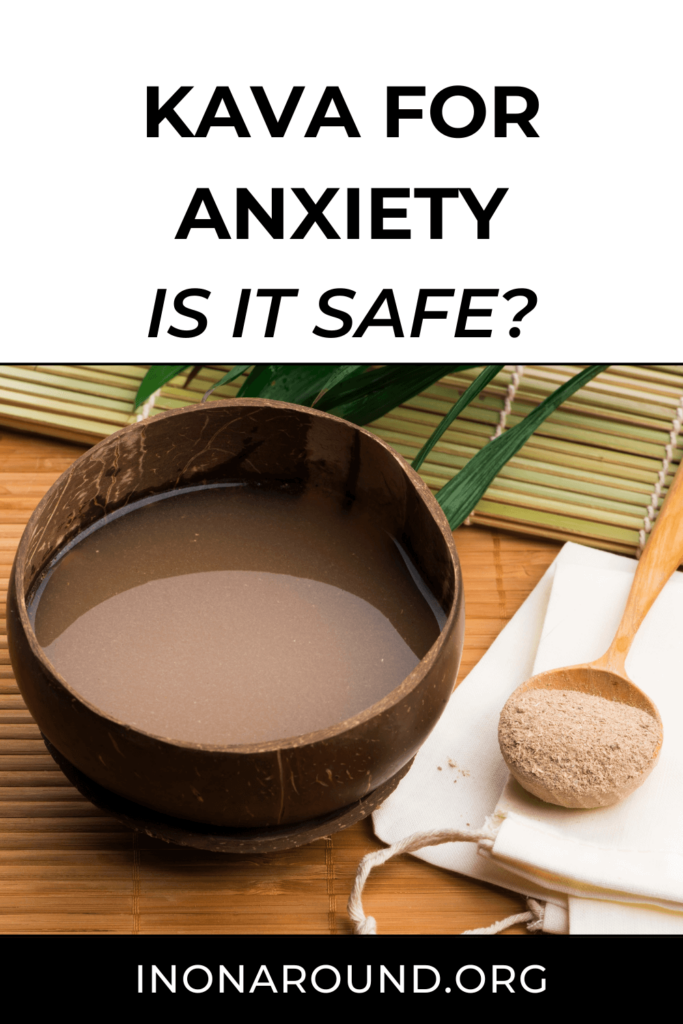
Frequently Asked Questions – Kava Safety
Click on the below FAQs to learn more about “kavaculture.”
What Is Kava?
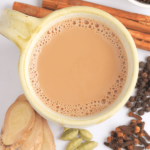
Kava is made from the root of a plant in the South Pacific, Piper methysticum, which is a member of the pepper family. It’s traditionally been used in formal, sacred, ancient ceremonies in Polynesian culture. In fact, the name “kava” is referring to its bitter taste in the Indigenous language of Tongan.
How Is Kava Consumed?
How Does Kava Impact The Body?

It’s not completely understood how the 18 different kavalactones in kava react. According to animal studies, it’s suggested that kava interferes with norepinephrine reuptake and can influence the vagal heart tone in people with generalized anxiety. It also impacts the GABA (gamma-aminobutyric acid) and NMDA (N-methyl-D-aspartate) nerve receptors. Hippocampal neurons, acetylcholinesterase, and dopamine may also be impacted.
Can You Drink Alcohol With Kava?
Have you tried kava?
Let me know your thoughts and key takeaways in the comments below!
You can watch our web story here.
xoxo,

Want to read more? Check out my other articles here!
Other references on “Is Kava Safe?”: UCLA Health, Kava: The Pacific Drug, Mount Sinai, ADF, NIH, Pharmacists MB, Better Health, GoodRX, New York Times, CDC, Verywell Mind, URMC, RX List, Psychology Today, Healthline, Roots Of Being, Paper Magazine, Dave Asprey, Kava Society, Kavafied, ESPN, The Verge, The Conversation, Psych Central, Psycom, Kalm With Kava, Florida Rehab, Mental Health America
Copyright In On Around LLC 2023 ©. The statements made on this website have not been evaluated by the FDA (U.S. Food & Drug Administration). They are not intended to diagnose, treat, cure, or prevent any disease. The information provided by this website should not be used as individual medical advice and you should always consult your doctor for individual recommendations and treatment. The information contained in this site is provided on an “as is” basis. Related to this site, there are no guarantees of completeness, accuracy, usefulness, or timeliness. In On Around LLC assumes no responsibility or liability for any errors or omissions in the content of this site.

